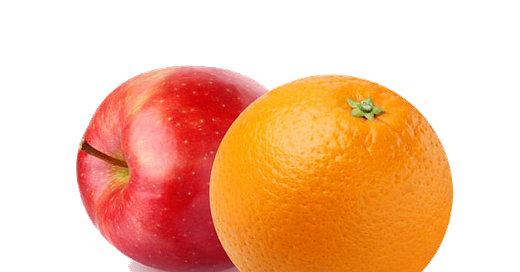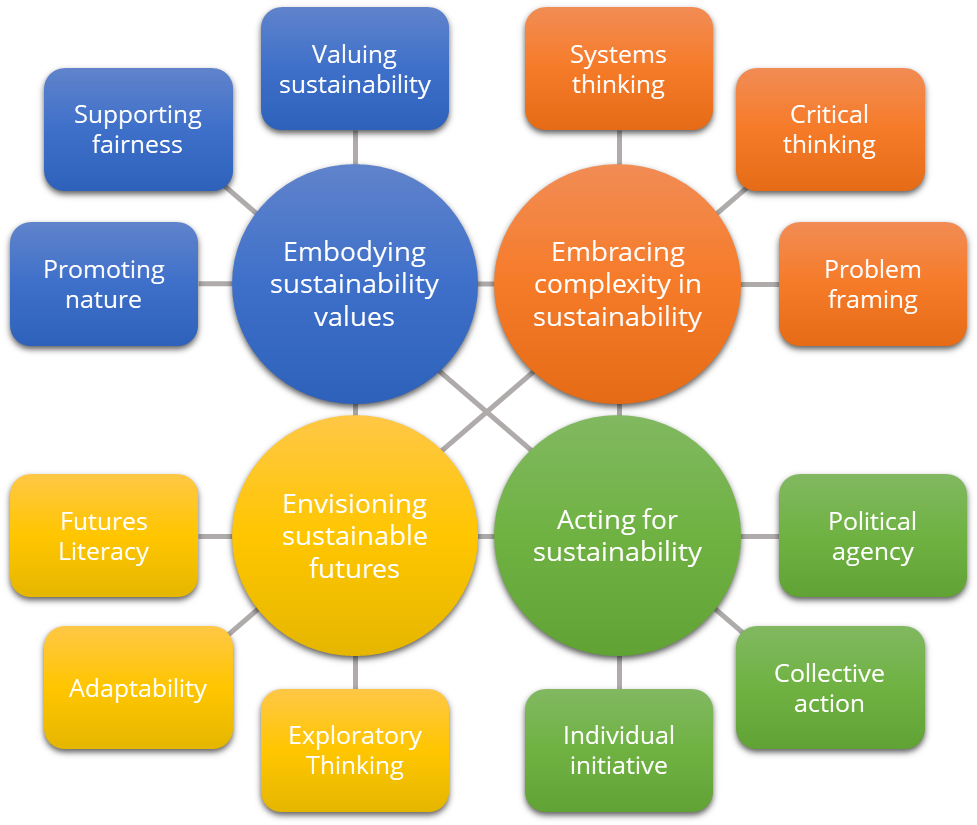Apples and oranges
When it comes to competences for sustainability, there are those related to what people do and those related to the way they think.
It ought to be remembered that there is nothing more difficult to take in hand, more perilous to conduct, or more uncertain in its success, than to take the lead in the introduction of a new order of things. Because the innovator makes enemies with all those who have done well under the old conditions and has but lukewarm defenders in those who may do well under the new.
Niccolò Machiavelli, The Prince
One of the fundamental lessons we learned during our consulting days was that it’s much easier to change the structure and functions of an organisation than it is to change its culture. Not that either of these are easy, mind. But, while modifying organisation structures might typically involve altering reporting relationships, departments, job roles, and hierarchies, changing organisational cultures involves messing with the shared values, beliefs, norms, and behaviours that shape collective mindsets. And while changing a reporting line might be hard enough, shifting the way an organisation thinks is way harder.
This is no more true, in our opinions at least, than in moving organisations towards being truly sustainable. And the type of paradigm-shifting changes in values needed to create good corporate citizens also apply to the individuals operating within them. As well as, arguably, across the whole of society.
For one reason and another, we went back the other day to look at our April post on green skills frameworks1. As we wrote at the time, skills frameworks of all types have value in ‘providing a common language for frictionless communication between workers, employers, educators and learners’. For the post, we’d reached into the toy box and pulled out a few of the more ‘functional’ frameworks; in other words, those relating more to the jobs people do rather than the way people think. There were the general frameworks, like the public, easily-downloadable O*NET and ESCO databases, together with some of the more targeted, directly-actionable ones like SkillsFuture Singapore (SSG) and SFIA. Not that any of these are sustainability-centric; along the way, though, we did dip into one or two of the more green economy-oriented resources, like the ALLBATTS skill cards for the European EV battery industry.
We also mentioned other types of frameworks there, the ones related more to how people think and act for sustainability rather than simply the tasks they do. IEMA’s Sustainability Skills Map, for instance, loaded with good things like leadership for change, analytical thinking, and resilience, risk & continual improvement. And, while we didn’t specifically mention them in the post, we looked at a good few others, like the European sustainability competence framework, GreenComp2.
Now, this one is interesting. Described as…
A catalyst to promote learning on environmental sustainability [which] identifies a set of sustainability competences to feed into education programmes to help learners develop knowledge, skills and attitudes that promote ways to think, plan and act with empathy, responsibility, and care for our planet and for public health.
Source: GreenComp
…surely it’s not something to be ignored. It’s European, of course, and in post-Brexit Britain there is always the danger of throwing out babies with tubs of bath water. But, in the spirit of equity (a good sustainability word), let’s take a look to see what it offers.
On the face of it, GreenComp is quite simple, which you could argue it should be if they want everyone to understand it. There are four competence areas, each with three competences, as we show below:
Image: TGE
The accompanying narrative seems, by and large, quite pragmatic, telling us that the twelve sustainability competences are interconnected and should be acquired by everyone, but individuals don’t need to reach the highest level of proficiency in all twelve, nor have the same proficiency across all of them. Phew, that’s a relief; people do have vastly different capacities for taking in this stuff, especially when we think about the competences involved in embracing complexity. We could argue, though, that basic levels of proficiency could be a useful target to aim for across society in general – which is pretty much what GreenComp is saying when it writes ‘[GreenComp] provides a conceptual reference model that everyone involved in lifelong learning can use’. It does though, in our opinion at least, get a little swivel-eyed when it tries to explain the inter-relationships through a beehive metaphor, with the bees, flowers, pollen and nectar, and the hive itself all representing different areas of competence. Oh well, perhaps that’s just us being a little too literal in our thinking.
Image: GreenComp
More helpfully, each GreenComp competence breaks down into sets of knowledge, skills and attitudes (behaviours), no doubt aiming to align with the KSB-driven approach to end-point assessments we see these days. And here we see useful crossovers into functional competences: knowledge of life cycle thinking and its relevance for sustainable production and consumption; interdisciplinary skills for problem framing and identifying the ‘wicked’ problems that need coalition-building to solve; and attitudes towards evidence-based perspectives and decreasing material consumption, for example3.
Now, don’t get us wrong here, we’re not necessarily evangelising for GreenComp. There are plenty of other frameworks out there. And there are some direct plug-ins with frameworks like O*NET, for example, which includes critical thinking as a basic process skill, describing it as ‘using logic and reasoning to identify the strengths and weaknesses of alternative solutions, conclusions, or approaches to problems’. We can even find a National Occupational Standard (NOS) or two on it.
But while GreenComp is pretty new (2022), it’s likely to be here for the long term. It tells us that as a reference tool, it’s being developed to serve a wide range of purposes, including curricula review; design of teacher education programmes; (self-) assessment/reflection; policy development; and certification, assessment, monitoring and evaluation. And it’s backed by the European Green Deal, which presumably means it’s got access to deep pockets to keep up with the burgeoning green economy and all its pathways, existing and new. We’re already seeing the emergence of spinout implementation projects, like the GreenComp Enterprises project, aiming to ‘[boost] the startup of green and ethical enterprises, based on GreenComp competences’.
Thinking aloud, we can see how GreenComp might be used within, say, Bootcamp terrirory and, in particular, the IfATE apprenticeship framework. For the six Dark Green Royal Apprenticeships we find on the latest release of IfATE’s occupational maps - Corporate responsibility and sustainability practitioner (level 4); Sustainability business specialist (7); Forest establishment and maintenance craftsperson (3); Forest harvesting craftsperson (3); Countryside worker (2); and Low carbon heating technician (3) – GreenComp would, presumably, fit right in. Perhaps it’s even being used there already.
But for the more ‘wicked’ problems that the Green Apprenticeships and Technical Education Advisory Panel (GATE-AP) might be thinking about right now, like how to embed Circular Economy teaching across those apprenticeships, higher technical qualifications and T-Levels that require it – which, let’s face it, is pretty much all of them – then GreenComp may be worth a look.
We’ll be returning to this topic in future posts. Skill frameworks are obviously high on the agenda in our current work with City & Guilds. As ever, we welcome the thoughts of our readers and subscribers in comments and emails.
We still owe our apologies to Frans Hals.
We did, however, mention GreenComp in our podcast that week.
Although we may not necessarily agree with the attitude ‘Trusts science even when lacking some of the knowledge required to fully understand scientific claims’. Particularly after the role ‘science’ played during the pandemic response.








